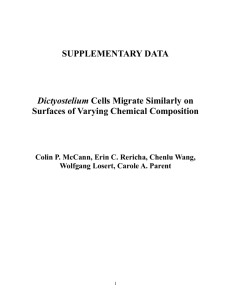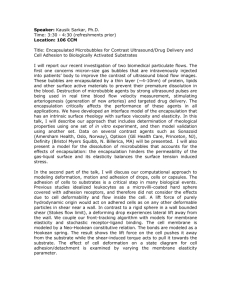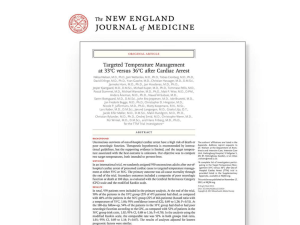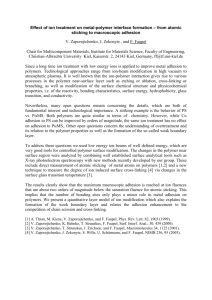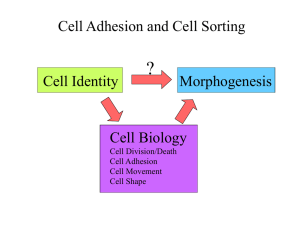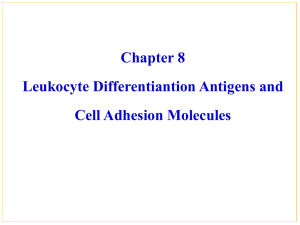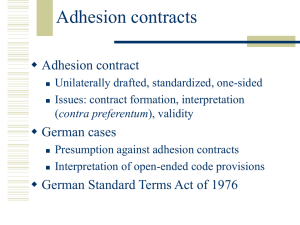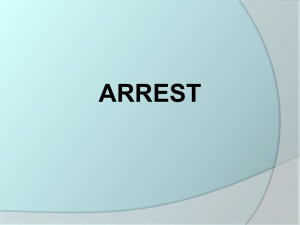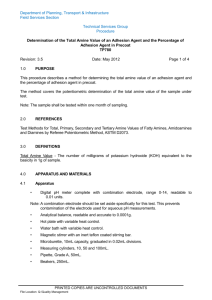BeQuanti webinar
advertisement
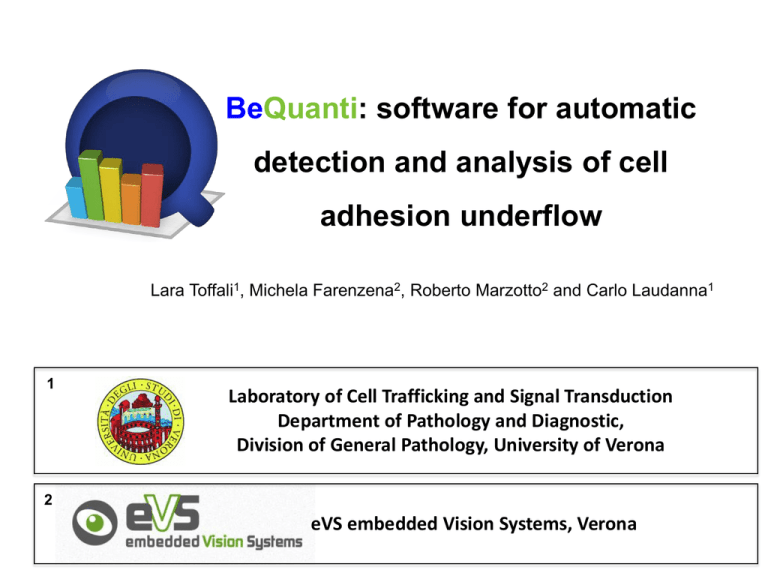
BeQuanti: software for automatic detection and analysis of cell adhesion underflow Lara Toffali1, Michela Farenzena2, Roberto Marzotto2 and Carlo Laudanna1 1 Laboratory of Cell Trafficking and Signal Transduction Department of Pathology and Diagnostic, Division of General Pathology, University of Verona 2 eVS embedded Vision Systems, Verona Immune system: right site at right moment The multistep model of leukocyte recruitment Blood flow Tethering and Rolling Activation Arrest Mucins, selectins, integrins Chemokines or Chemoattractans Integrins Stabilization Spreading Transmigration Endothelial cells ms Immunodeficiency, autoimmune diseases and cancer s min Bioflux facility in Laudanna’s Laboratory Laboratory of Cell Trafficking and Signal Transduction Department of Pathology and Diagnostic, Division of General Pathology University of Verona Bioflux facility in Laudanna’s Laboratory Glass capillaries vs Bioflux microfluidics Glass capillary Bioflux microfluidics Underflow adhesion assays with Bioflux Leukocytes adhesion uderflow at 2 dyne/cm2 Selectin ICAM-1 Chemokines Recording: 25 frames/s Movie length: 5-10 minutes = Total frames: 7500-15000 Manually performed movie analysis Limited Time consuming Prone to errors Tedious BeQuanti (for Behavior Quantification) The Automated Tool for Cell Behavior Quantification Laboratory of Cell Trafficking and Signal Transduction Carlo Laudanna Roberto Marzotto Lara Toffali Michela Farenzena BeQuanti comparison with other packages Leucotrak: Willenbrock, F. et al., Biophys J. 105, 1110-22 (2013). ImageJ: Meyer dos Santos, S. et al. Platelets. 21, 60-6 (2010). ImagoQuant: Giegold, O. et al., Exp Dermatol. 18, 238-45 (2009). BeQuanti: licensing » Trial free license Feature Limitation Time period 30 days Number of sequences per video Max 2 sequences Sequence length Max 500 frames Batch mode Not included Export results Not included » Full license » No features limitations » Node lock license » Updates included up to the next major release » Unlimited technical support eVS embedded Vision Systems Srl www.embeddedvisionsystems.it info@evsys.it BeQuanti The Automated Tool for Cell Behavior Quantification DV, MPEG, Mov and AVI For each frame a list of cell positions (x, y) A list of cell, for each cell the frames and position in which it appears Tethering, Rolling, Subrolling Arrest and Unclassified Round, Polarized, Spread and Unknown BeQuanti The Automated Tool for Cell Behavior Quantification 1. New project 2. Analysis 3. Data 1. New project and Movie import 1. Sequence Selection 1. Edit Analysis Parameters 1. Adhesion parameters Every single cell detected Adhesive behaviors (events) analysis Subrolling corresponds to very short cell movements detected between two distinct arrest events for a defined cell (adhesion stabilization) Subrolling threshold: Spatial Arrest Threshold S.A.T. maximal tolerated small cell movements distinguishing arrest versus rolling Temporal Arrest Threshold T.A.T. temporal cutoff defining arrest versus rolling maximal tolerated small cell movements (between two distinct arrest events) distinguishing subrolling versus rolling Cell arrest is fully defined by the combination of S.A.T. and T.A.T. 1. Adhesion parameters 1. Global Analysis vs Parametric Analysis Incremental T. A. T. 0,04 s 3s Frequency of 1/fps Fixed T. A. T. 1. Start analysis BeQuanti supports multiprocessor and multi-core architectures BeQuanti The Automated Tool for Cell Behavior Quantification 2. Analysis 2. Play Mode: detections 2. Play Mode: Tracking 2. Play Mode: Events 2. Play Mode: Arrested Types BeQuanti The Automated Tool for Cell Behavior Quantification 3. Data 3. Results report: Parametric Analysis Total 3. Results report: Parametric Analysis Normalized 3. Target an individual cell directly on the movie 3. Target an individual cell directly on the movie 25 3. Results report: Cell Morphology Analysis 3. Results report: Cell Morphology Analysis 3. Results report: Global Adhesion Analysis 0,04 s 3s Incremental T. A. T. 3. Results report: Global Adhesion Analysis 0,04 s 3s Total 3. Results report: Global Adhesion Analysis 0,04 s Normalized 3s 3. Export results (cvs format) 3. Example: h-PMN with PTx CELL TYPE: Human primary neutrophils isolated from healthy volunteers by standard gradient centrifugation (Ficoll). Contaminating erythrocytes were removed by dextran-500 sedimentation followed by hypotonic lysis. TREATMENT: Primary neutrophils were treated or not with 2 μg/ml Pertussis Toxin (PTx) for 3 h at 37°C COATING: 1 ug/ml P-Selectin, 5 μg/ml ICAM-1 and 25 nM FMLP PARAMETERS: S.A.T. 5 μm – T.A.T. 2s – Sub-rolling threshold 20 μm PMN treated with Pertussis Toxin (2 μg/ml) PMN control 0,4 0,21 0,08 0,02 Future developments Detection of different kind of cells Analysis of cell behavior on different backgrounds, including adhesion: - on endothelial cells - in different experimental settings (Intravital microscopy or glass capillary) Detection of cell motility underflow, such as cell crawling and transmigration BeQuanti was developed and tested to analyze underflow experiments performed with BioFlux system at 20x phase contrast magnification BeQuanti is fully customizable upon request! Laboratory of Cell Trafficking and Signal Transduction Department of Pathology and Diagnostic, Division of General Pathology University of Verona Carlo Laudanna Roberto Marzotto carlo.laudanna@univr.it roberto.marzotto@evsys.it +39 0458027689 +39 045 8949180 Lara Toffali Michela Farenzena lara.toffali@univr.it michela.farenzena@evsys.it +39 0458027145 +39 045 8949180 http://dp.univr.it/~laudanna/LCTST/index.html www.embeddedvisionsystems.it info@evsys.it Image processing details » Cells Detection: cells classification by a discriminative classifier trained on cells images, based on gradient orientation » Cells Tracking: global optimal matching » Events Classification: exhaustive recursive search » Cells Morphology Classification: shape and color based classification
